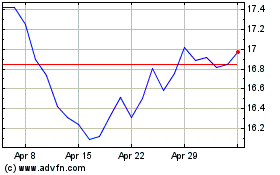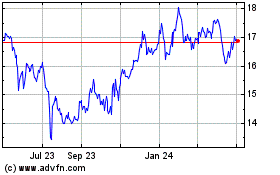By Joe Flint and Patience Haggin
When AT&T Inc. agreed to buy Time Warner nearly three years
ago, it promised to create an entertainment and advertising
behemoth that could take on Silicon Valley giants like Alphabet
Inc.'s Google and Netflix Inc.
Now, the telecom giant is under pressure to deliver.
Elliott Management Corp., the activist investor that disclosed a
stake in AT&T on Monday, said in a letter to the company that
it has "failed to articulate a clear strategic rationale" for the
$80 billion-plus Time Warner acquisition.
AT&T had told Wall Street and regulators that Time Warner --
which was re-christened WarnerMedia -- would help it launch into
the streaming-video wars, boost its traditional wireless and pay-TV
services and build up an advertising-analytics business that could
benefit the TV industry broadly.
But Elliott said that when it comes to direct-to-consumer
streaming, there is a "growing sense that AT&T doesn't have a
plan," given recent shifts in strategy. And it said the departure
of top Time Warner executives leaves the company without necessary
media expertise at a critical moment in the industry.
"While it is too soon to tell whether AT&T can create value
with Time Warner, we remain cautious on the benefits of this
combination," Elliott said. The investment firm called for AT&T
to focus more on execution, rather than acquisitions, and divest
itself of any noncore assets across its business.
A lengthy antitrust battle with the Justice Department, which
came to a close only in February, significantly slowed AT&T's
ability to integrate Time Warner. AT&T said Monday that it is
already executing many of the actions outlined by Elliott.
One of the biggest priorities for AT&T is launching a new
direct-to-consumer streaming service to compete with Netflix and
other rivals. The company initially laid out plans to offer a
three-tiered platform, with an entry-level option focused on movies
and additional tiers with the premium HBO Now and Warner Bros.
programming. AT&T initially said the service would launch in
late 2019.
By this summer, the company had shifted to focus on a single
offering, HBO Max. "This quick reversal has intensified the
skepticism around WarnerMedia, its OTT strategy and the management
of the business itself, " Elliott said.
AT&T now says there will be a limited or "beta" launch late
this year, with a broad commercial launch next spring, after rival
offerings from Walt Disney Co. and Apple Inc. have already hit the
market.
WarnerMedia executives counter that while there have been tweaks
to the strategy, it isn't fair to say there is "confusion" and a
"lack of plan, " as Elliott claimed. The long antitrust battle
against the government slowed the company down, the executives
said, and AT&T plans to lay out its strategy at an investor
meeting at the end of October.
WarnerMedia has unveiled a large number of original TV shows and
movies for HBO Max as well as reacquiring key library content
including reruns of the hit comedy "Friends." It hasn't yet
announced a price for the service, but it is likely to cost
slightly more than the $14.99 average price for HBO Now, a person
familiar with the matter has said.
Disney earlier this year said its streaming service, Disney+,
would launch in November and cost $6.99 a month. Apple hasn't yet
disclosed the price of Apple TV Plus, which is set to debut this
fall.
After prevailing in the antitrust fight, AT&T moved to break
down the corporate walls and fiefs at WarnerMedia, leading to the
exits of the top executives at the HBO and Turner divisions this
spring. AT&T Chief Executive Randall Stephenson had earlier
said he wasn't looking to change the culture of WarnerMedia nor the
leadership at key units.
The executive AT&T picked to lead WarnerMedia, John Stankey,
has since emerged as the likely successor to Mr. Stephenson.
"For a content business now owned by a telecommunications
company and under the direct supervision of a lifelong telecom
executive, this lack of continuity in leadership presents a real
concern for investors," Elliott said.
While some senior executives such as HBO head Richard Plepler
have left the company, WarnerMedia has also brought in new
management including Robert Greenblatt, former NBC and Showtime
programming chief as chairman of WarnerMedia entertainment.
AT&T also said it would upend the $70 billion traditional
television-advertising market, using its reams of data -- on
everything from its DirecTV subscribers to where its customers take
their phones -- to help advertisers target consumers with ads
across their TVs and digital devices.
The company's plans put the spotlight on Xandr, the targeted
advertising division created when AT&T acquired ad tech
marketplace AppNexus for about $1.6 billion in 2018. Cable and
satellite TV operators have long promised marketers would be able
to target TV commercials to individual homes, but the offering has
been slow to catch on. AT&T's plan has faced hurdles, including
privacy and regulatory concerns around how telecommunications and
broadband providers may leverage customer data.
Meanwhile, the Federal Trade Commission is scrutinizing how
AT&T and other internet-service providers use consumer data for
advertising. The agency ordered AT&T's advertising subsidiary
and other companies to provide information on their privacy
practices for user data last month. AT&T said at the time that
it would respond appropriately.
Xandr started making significant cuts to its ad-sales division
in July.
Elliott's letter called for a full review of AT&T's
portfolio, including its advertising assets.
Drew FitzGerald contributed to this article.
Write to Joe Flint at joe.flint@wsj.com and Patience Haggin at
patience.haggin@wsj.com
(END) Dow Jones Newswires
September 10, 2019 07:30 ET (11:30 GMT)
Copyright (c) 2019 Dow Jones & Company, Inc.
AT&T (NYSE:T)
Historical Stock Chart
From Aug 2024 to Sep 2024

AT&T (NYSE:T)
Historical Stock Chart
From Sep 2023 to Sep 2024
